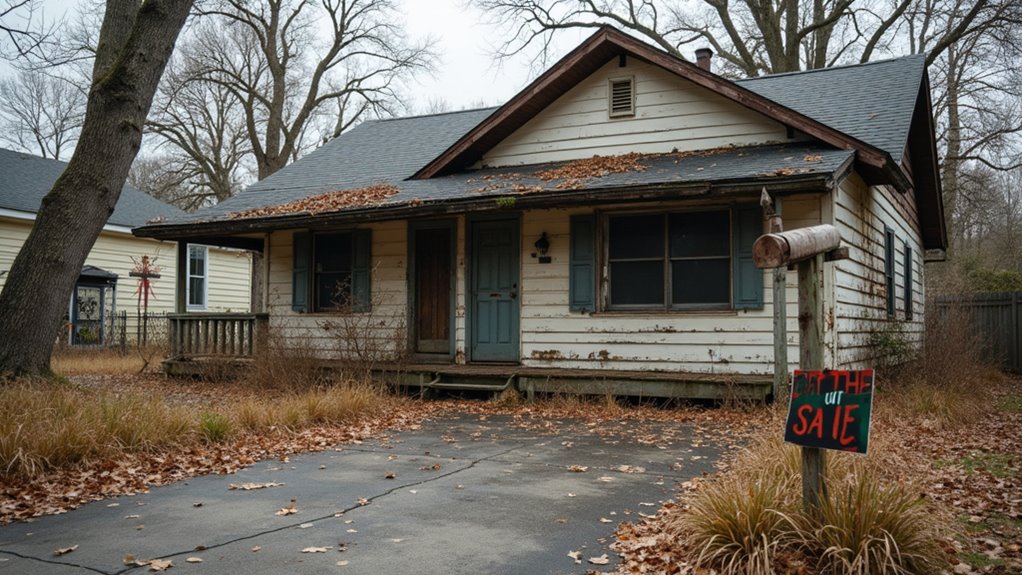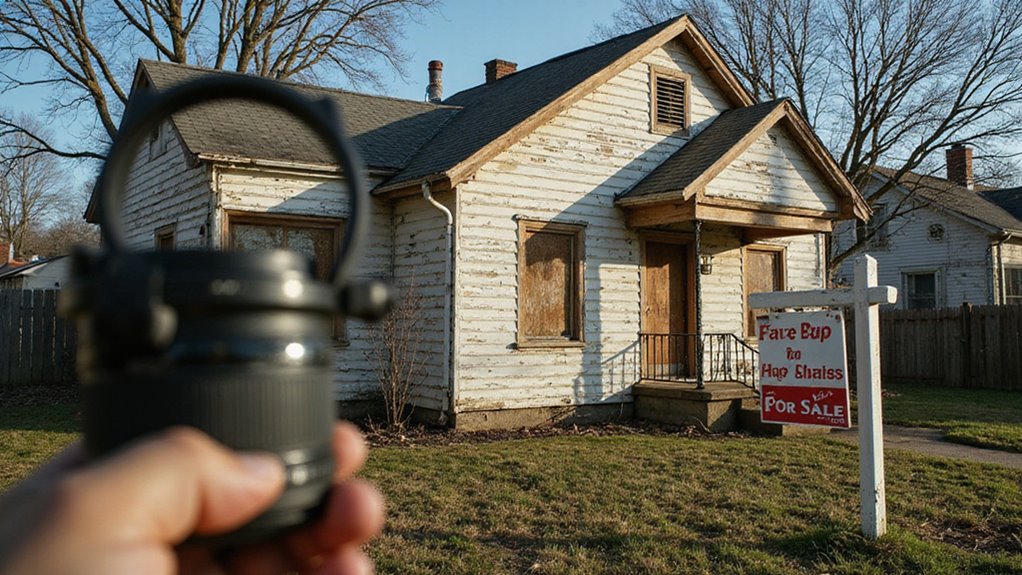Can You Sell a House As Is Without Inspection?
Selling a distressed property without inspection leaves many homeowners feeling uncertain about legal requirements and best practices. Navigating disclosure laws while trying to attract buyers can create significant stress during an already complicated process. Fortunately, selling a house as-is offers a streamlined alternative that appeals to specific buyer segments.
Yes, you can legally sell a house as-is without an inspection. This approach requires disclosing known defects but doesn’t obligate you to fix existing issues. Many sellers choose this route to save on repair costs and expedite their timeline. Cash buyers and investors often prefer as-is properties for their potential value.
In this blog I will explore everything related to selling houses as-is without inspection requirements.
Key Takeaways
- Selling as-is typically requires disclosing known defects; inspections are optional but may still occur during the process.
- Many states legally permit selling a house as-is without requiring an inspection, focusing on disclosure obligations.
- Buyers can request inspections despite the as-is sale, which might lead to negotiations or price adjustments.
- Pricing as-is homes 10-30% below market value attracts cash buyers and investors seeking renovation opportunities.
- Transparency about defects and proper disclosures protect sellers legally and facilitate smoother transactions.
What Does Selling a House “As Is” Mean?

Selling a house “as is” means offering your property without making any repairs or improvements. Buyers purchase the home in its current condition with all existing flaws. You have no obligation to fix issues discovered during inspections. This approach simplifies the selling process for homeowners.
However, legal requirements still apply. You must disclose any known material defects to potential buyers regardless of the “as is” status. Failing to disclose known problems could lead to legal trouble later.
The main benefit is avoiding repair negotiations and expenses. Buyers understand they accept the property with its current imperfections.
Why Would Someone Sell a House Without Inspection?

You might sell a house without inspection to save time and money, especially if you’re facing financial hardship or urgent deadlines.
Property issues or major repairs can make traditional sales difficult, prompting quick as-is deals.
In cases like estate sales or inherited homes, sellers often prioritize speed over inspections to settle matters swiftly.
Financial Constraints
Urgent money problems force many homeowners to sell without inspections. This option works best when you face foreclosure or significant debt. You can quickly convert your property to cash without paying for repairs first.
The process helps sellers with distressed homes or inherited properties move forward faster.
Homeowners typically save $300-500 on inspection costs and thousands on potential repairs. Your financial situation improves immediately through this streamlined approach. As a result, you can address pressing money concerns without additional expenses.
Time Pressure
Selling a house “as-is” saves valuable time when you’re in a hurry. You can skip repairs, inspections, and lengthy preparation steps. This approach works well for urgent situations like job relocations or family emergencies.
The process eliminates back-and-forth negotiations about property conditions. Many buyers look specifically for as-is properties they can renovate themselves.
Furthermore, you avoid the stress of coordinating contractors and managing renovation timelines.
Most as-is sales close 40% faster than traditional home sales. This quick turnaround helps you move forward with your life and address pressing needs without delay.
Property Condition Issues
Damaged properties often sell best through as-is transactions. Homes with significant problems attract fewer traditional buyers but appeal to investors seeking discounts.
Inherited properties frequently sell without repairs to speed up the settlement process. This approach saves time and money for sellers.
Property disclosure laws require sellers to reveal all known defects to potential buyers. Failure to disclose issues can lead to legal problems after closing. Transparency protects both parties during the transaction. Most states have specific disclosure requirements for real estate sales.
Being honest about condition issues builds trust with buyers. Clear documentation of problems prevents disputes later. Pricing the property appropriately for its condition helps attract the right buyers.
Estate Sales and Inherited Properties
Selling inherited property offers a fast path to cash without repair headaches. You can quickly settle estates and reduce the burden of ongoing maintenance costs. This approach works well for distant heirs who can’t manage the property directly.
Texas Property Code §5.008 requires disclosure of all known property defects. Legal protections depend on your honesty about the property’s condition.
Hidden defects could trigger lawsuits even in as-is sales. Furthermore, written documentation of known issues provides essential legal protection.
The financial relief comes with clear responsibilities. You must balance speed with transparency to avoid future problems.
Can You Legally Sell a House Without an Inspection?

Yes, selling a house without an inspection is legal in most states. You have the right to sell your property “as-is” without professional evaluation.
Most states require sellers to disclose known material defects in writing. This transparency protects both parties in the transaction. Hiding known problems can lead to serious legal consequences later.
Buyers may still request inspections as part of their due diligence. Many lenders also require inspections before approving mortgages for buyers.
Without an inspection, you might face negotiation challenges or lower offers. The property might also stay on the market longer due to buyer hesitation.
What Are the Pros and Cons of Selling “As Is”?
Selling “as is” can speed up your sale and lower repair costs, making it attractive to cash buyers and investors.
However, it also means accepting a lower price and narrowing your buyer pool, with possible legal risks if you don’t fully disclose defects.
Knowing the benefits, drawbacks, and disclosure rules helps you make a smart, compliant move.
Benefits for Sellers
Selling your house as-is saves money and time. You won’t need to pay for repairs or improvements before listing. Cash buyers often purchase as-is homes quickly.
As-is sales attract investors looking for properties to renovate and resell. These buyers typically make fast decisions without inspection contingencies. You’ll also avoid the stress of preparing your home for showings.
Furthermore, the closing process moves faster with as-is sales. Most as-is transactions close within 7-10 days, compared to 30-45 days for traditional sales. This option works well for urgent situations like relocations or financial difficulties.
In addition, you’ll serve budget-conscious buyers seeking affordable homes they can customize.
Potential Drawbacks
Selling a house as-is reduces your profit significantly. You can expect to receive 10-30% less than market value for properties with known issues. The buyer pool shrinks considerably without inspection contingencies. Most qualified buyers prefer homes with fewer problems.
Legal risks represent another major concern. Failure to disclose known defects can result in lawsuits after closing. In most states, sellers must report all material defects they’re aware of. Despite selling “as-is,” you remain legally responsible for proper disclosures.
Furthermore, these transactions often attract investors rather than families looking for homes. This typically means cash offers at reduced prices.
Disclosure Requirements
You must disclose all known property defects when selling a house as-is in Texas. This requirement exists despite no obligation to make repairs.
State law mandates complete transparency about property conditions to protect buyers. Honest disclosure builds trust with potential buyers and prevents future disputes. The consequences of hiding defects can be severe.
Sellers who fail to disclose face potential lawsuits, financial penalties, and damage to reputation. Your legal protection comes from truthful communication.
Proper disclosure serves both parties effectively. Buyers appreciate knowing exactly what they’re purchasing. This transparency creates smoother transactions and reduces post-sale complications.
How to Sell Your House “As Is” Successfully?
To sell your house “as is” successfully, start by setting a realistic price based on comparable properties and your home’s condition.
Next, prepare honest disclosures to build trust and avoid legal issues down the line. Finally, target the right buyers and negotiate transparently to close the deal quickly and confidently.
Determining a Realistic Price
Calculate market value first, then subtract repair costs. Start by researching recent sales of similar as-is properties in your neighborhood.
Local comparable sales provide the most accurate baseline value for your home. Next, estimate necessary repairs and deduct these costs from your price.
Most as-is homes sell for 10-30% below market value depending on condition. A real estate agent with as-is selling experience can offer crucial guidance. They understand buyer expectations in your market.
Their expertise helps you avoid overpricing that scares buyers away. Furthermore, agents can recommend strategic pricing that attracts multiple offers.
Preparing Necessary Disclosures
Complete your seller’s disclosure form truthfully to build buyer trust. You must reveal all known defects like structural issues, water damage, or electrical problems. State law requires sellers to disclose material facts about their property.
Honest disclosure prevents future legal disputes and liability. Your transparency helps buyers make informed decisions about as-is purchases. Most states mandate specific disclosure forms listing property conditions.
Failure to disclose known issues can result in lawsuits even with as-is sales. Documentation of past repairs also reassures potential buyers. When in doubt, always disclose the issue rather than hide it. This approach protects both parties throughout the transaction.
Marketing to the Right Buyers
Target cash buyers, investors, and renovation enthusiasts when selling as-is properties. These buyers appreciate homes that need work and can close deals quickly. Price your property competitively based on comparable as-is sales in your area.
Quality photos and virtual tours make your listing stand out even without repairs. They help buyers visualize potential despite existing flaws.
Experienced real estate agents bring valuable connections to this specialized market. Furthermore, agents ensure proper disclosure of property conditions to avoid future legal issues.
Their marketing networks reach motivated buyers who specifically look for as-is opportunities.
Negotiating with Potential Buyers
Price your as-is property 10-30% lower than move-in ready homes. This realistic pricing reflects the true condition and creates immediate buyer interest. Always disclose all known defects to establish trust and avoid future legal issues.
Consider offering inspection contingency waivers to motivated buyers. This strategy speeds up the closing process while protecting you from post-sale complaints.
The right marketing approach highlights the property’s potential rather than its flaws. Many investors and renovation enthusiasts specifically search for as-is properties at discounted prices.
Laws in most states require disclosure of major defects even in as-is sales. Remember that transparent negotiations build credibility and attract serious buyers.
Who Typically Buys Houses “As Is”?
Typically, buyers of “as is” homes are investors looking for quick flips or rental properties. Cash buyers dominate this market because they avoid loan delays and close fast.
Budget-conscious buyers and renovation enthusiasts also seek these homes to customize or renovate at a lower upfront cost.
Cash Home Buyers
Cash home buyers purchase properties “as is” without requiring repairs. These buyers include real estate investors and house flippers who target fixer-upper homes. They typically offer 10-30% below market value to account for renovation costs.
Most cash buyers waive inspections and can close quickly, often within 7-10 days. This arrangement benefits sellers who need to move fast or avoid repair expenses.
Furthermore, these investors specialize in rehabilitating and reselling properties for profit.
For homeowners seeking a hassle-free sale, cash buyers eliminate many traditional selling complications. No showings, repairs, or lengthy negotiations are needed.
Real Estate Investors
Cash investors purchase properties in any condition to avoid delays. They look for homes needing work where they can add value through repairs. Most cash buyers have renovation expertise and can spot profitable opportunities quickly. Their business model thrives on solving property problems.
House flippers buy distressed homes, renovate them, and sell for profit. Landlords focus on creating rentable units with minimal investment.
Furthermore, wholesalers connect sellers to buyers without making repairs themselves. As a result, cash buyers offer faster closings with fewer requirements than traditional buyers.
Renovation Enthusiasts
Renovation enthusiasts actively seek as-is properties to transform and resell for profit. They recognize potential in distressed homes where others see problems. These buyers specifically target undervalued properties needing repairs to maximize their return on investment.
Renovation buyers prefer properties sold without repairs, seeking a 20-30% discount from market value. Most want straightforward transactions with minimal complications. The challenge of restoration motivates them, not just potential profits.
Through their work, these investors improve neighborhoods by revitalizing neglected properties. Furthermore, they create more livable spaces for future homeowners.
Budget-Conscious Buyers
As-is properties offer significant savings for budget-conscious buyers. These properties cost less than move-in ready homes and provide renovation flexibility. Buyers include investors seeking profitable flips, first-time homeowners stretching their budgets, and DIY enthusiasts.
The main appeal lies in lower purchase prices and faster closing processes. However, careful inspection of disclosure documents remains essential. These properties may have major defects that become the buyer’s responsibility after purchase.
Smart buyers always budget for unexpected repairs and conduct thorough inspections.
Furthermore, financing options might be limited for severely damaged properties. Most successful budget buyers maintain realistic expectations about renovation costs and timelines.
What Should You Disclose When Selling “As Is”?
Sellers must disclose all known material defects when selling a house “as is.” This protects you from legal issues and creates transparency with buyers.
You must report structural problems, water damage, and pest infestations. Electrical and plumbing issues require disclosure as well.
Environmental hazards like flood zones or lead paint must be included in your disclosures. Furthermore, honest disclosure builds trust with potential buyers. It helps prevent future lawsuits and complications.
Remember that “as is” selling doesn’t exempt you from disclosure requirements. In most cases, full transparency creates smoother transactions.
Ready to Sell Your House “As Is”? Contact Next Step House Buyers Today
You can sell your house as-is through Next Step House Buyers. We purchase homes in any condition without requiring repairs. Our process eliminates paperwork hassles and lengthy waiting periods.
We provide fair cash offers based on your property’s current state. All legal requirements are handled by our team, including inspection waivers. This protection allows you to sell confidently without representation.
Furthermore, our transparent approach means no hidden fees or surprise deductions. Many sellers appreciate the simplicity and speed of our process. Contact us today to get your no-obligation offer.
Frequently Asked Questions
Can I Sell a House Without Inspection?
You can sell your house without an inspection, offering a straightforward opportunity for buyers to see the property’s current state. Just remember to honestly disclose all known issues, ensuring transparency and compliance, which fosters trust and smooth transactions.
What Is the Biggest Red Flag in a Home Inspection?
The biggest red flag in a home inspection is major structural issues like foundation cracks or bowing walls. Addressing these problems quickly can prevent costly repairs and protect future buyers, ensuring a smoother sale and satisfied clients.
Does Sold As-Is Mean No Inspection?
Selling as-is doesn’t mean no inspection; buyers can still request one. However, as a seller, you’re not obligated to repair issues. Disclose all known defects to serve buyers honestly and stay compliant with Texas law.
Why Do Sellers Want Inspection Waived?
You waive inspections to speed up the deal, attract eager buyers, and avoid repair costs. Ironically, this transparency helps others serve their needs faster, while you capitalize on quick sales and reduced hassle—an efficient win-win.
